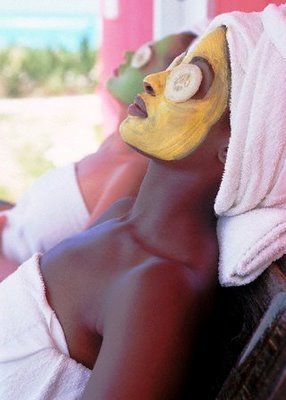I have worked in the spa industry for 19 years and have had maybe three great facials in that time.
Beauty schools as a whole tend to disregard brown skin in their curriculum, despite the rapidly growing high degree of ethnic spa-goers. This omission in education not only places people of color in the lowest position of the spa professional's learning curve, it also significantly inhibits the professional's ability to market and provide service to a broad multi-ethnic base of clients.
Kelly McDonald, one of the nation's top experts in multicultural marketing and consumer trends, recently addressed this issue during my interview with her at the International Spa Association's (ISPA) Conference and Expo held at the Mandalay Bay Resort in Las Vegas after teaching their Master's Class.
So keeping it very real, I'm wondering where your insight on the ethnic experience comes from?
I'm a marketing person and I think it's our job to stay abreast of data and stats on consumer trends. I lived in Texas for 26 years and I couldn't help but notice the demographic changes going on around me, especially in the Hispanic market. That got me interested in all demographic changes and as I started digging more deeply into consumers, I took an interest in understanding how we're not this one size fits all world.
Prior to starting my own company I was director of client services for one of the top Hispanic ad agencies in the country. What I found is that marketing to Hispanics is one particular approach that is of interest to a lot of brands, consumers and companies. Usually if they are open to that, they value all customers. So that opened the door for me in terms of marketing to ethnic customers, I sort of hung my skills in that area and then broadened them as I got more clients.
Is this your first presentation for people in the spa and wellness arena?
Yes it is. I'm very excited as it is my first time being here.
What do you think was ISPA's motivation in presenting such a hot button issue?
That's easy. I think that ISPA is very forward thinking and they're paying attention to the fact that consumers are becoming more diverse across the country. Any business should want to cater to a growing customer base, so if you're in the spa industry you have an opportunity to reach out to customers that you probably previously hadn't made an effort to cultivate.
How do you think your presentation was received?
It was received very well. It was gratifying to have over 200 people attend the class who not only came in a day early and spent their Sunday learning how to grow their business; I mean they could have been out by the pool but they were in that session because they value this information, and understand it enough to know that they need to get educated about the right approach, why it's important and how to do it correctly.
Were you seeing "major players" and large hotels?
Yes, I didn't have a chance to speak with everyone but several people mentioned that they were the operators of well know brand name Five-Star properties all across the country.
Let's take this a step further. What is it that business owners need to do with regard to "operational readiness" as you call it in your book?
I think it all begins with operational readiness.
The analogy that I use in my book is that you don't throw a party before cleaning your house and stocking the bar; do that first and then you invite the friends over. It's about employee training, continued emphasis on customer focus and continually refining your customer approach. Owners have to keep their ear to the ground and listen to feedback.
So the number one piece of advice that I would offer to anyone trying to reach out to a new customer base is this; if possible hire someone from that market group!
If you want to reach senior citizens it would be helpful to have someone who's senior on staff because they're going to understand that perspective. If you are trying to reach African Americans at your spa, you need to have some estheticians of color. If you want to reach Hispanics then get someone on staff that has language skills. It's not that hard to understand; people gravitate to people they feel comfortable with and often that is someone who looks like them, speaks their language, is their gender or in their age group.
My personal concern is the inability of many Five-Star spas to offer knowledgeable quality service for my skin.
They've got to educate and train their staff or get the right people in there who can help those customers with their skin or wellness needs. I don't suggest that it's an easy proposition, it requires a business owner to really look at their clientele and say -- "Where's our high potential prospect, how do we go about getting them? Are we in fact prepared to deliver the kind of spa and brand experience that all of our customers have come to expect from us, not just our White customers but all of our customers?"
Kelly what is the takeaway that you want to share?
That diversity is a business opportunity. It isn't the right thing to do, or the politically correct thing to do. It's about that but not just about that. The reason to do it is that it will grow your business. Not just the volume but more importantly it will cultivate customer loyalty. Your staff will be better; your business will be healthier and less receptive and vulnerable to market conditions.

